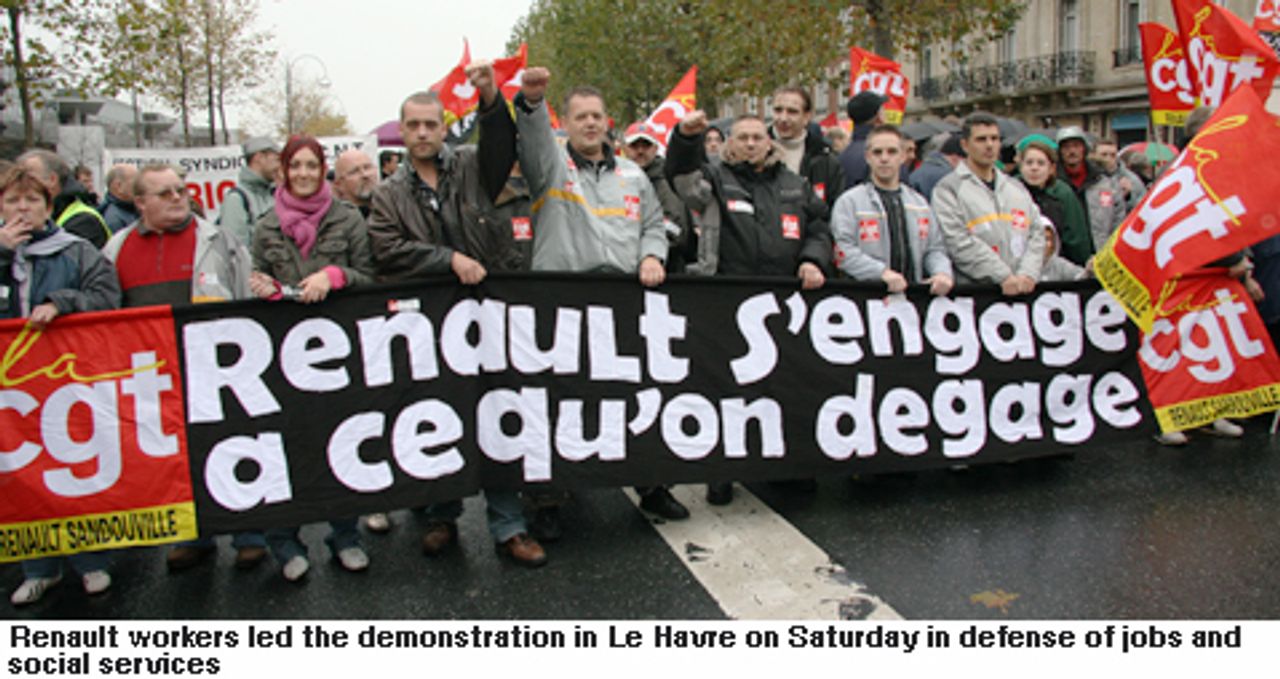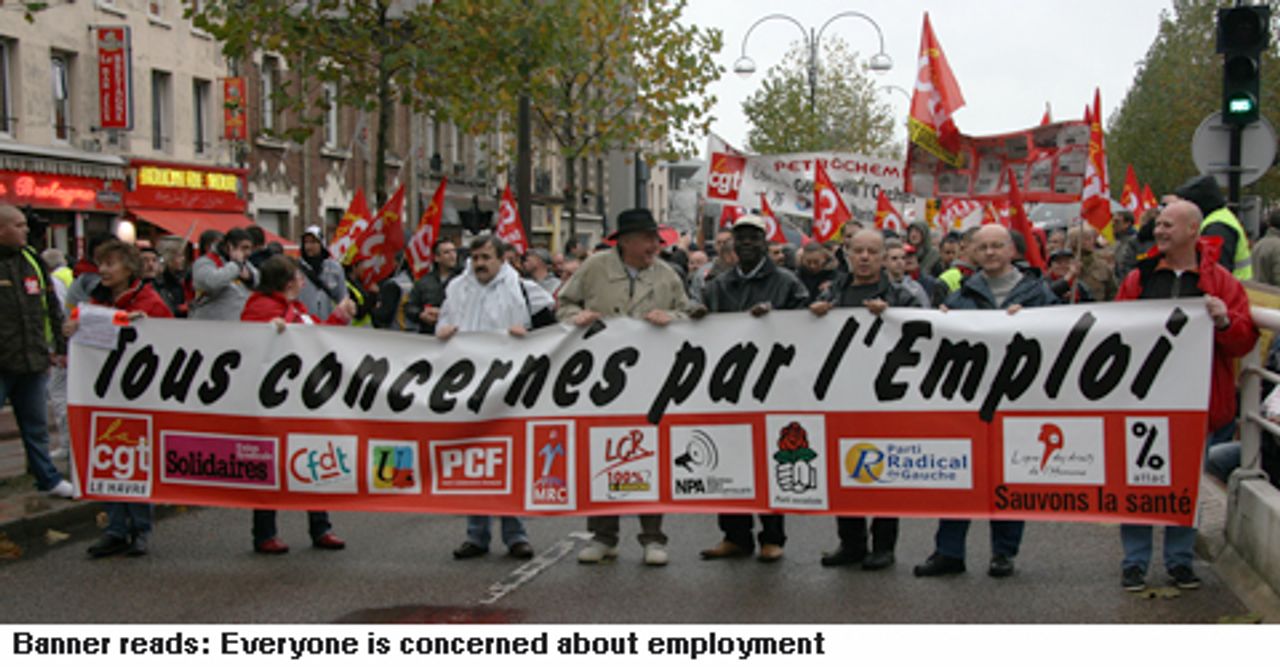Some 3,000 people joined a regional demonstration in Le Havre, capital of the Normandy region of France, on Saturday, November 9, in defence of jobs and social services.
Renault workers had pride of place in the demonstration, led by the Sandouville contingent, which stands to lose 1,150 of its 3,700 labour force. A further 4,000 jobs in industries which supply the plant are also threatened. Delegations from Renault-Cléon and Renault-Flins also participated.

The impact of the gathering global recession on France was reflected by the presence in the protest of workers from many private and public sector workplaces who face job losses and closures.
The hospital service stands to lose 800 staff as part of 20,000 job losses nationwide. Delegations from Le Havre Hospital and health service support groups marched with post office workers opposing privatisation and the consequent rationalisations. Also present were teachers opposing the planned loss of over 13,000 staff next year, in addition to 11,000 job cuts this year; workers from Total refineries; the furniture factory Interiors; EDF electricity utility power plant and customs staff.
The mobilisation was based on an appeal sponsored by local trade union branches of the CGT (General Confederation of Labour, close to the Communist Party, PCF), the CFDT (French Democratic Confederation of Labour, close to the Socialist Party) and SUD (Solidarity-Unity-Democracy).
Renault-Sandouville workers told the World Socialist Web Site that they were losing between €200 and €400 per month from partial layoffs. Renault factories at Flins and Douai are on a two-week shutdown and those at Mabeuge, Batailly and Dieppe are closed for one week until November 12. There are also one to four days of shut-down at the Bursa plant in Turkey and the Novo Mesto site in Slovenia. PSA Peugeot-Citroën intends to reduce planned production by 30 percent and has announced partial shutdowns, ranging from between two to 16 days, throughout its sites in Europe.
But the unions kept the protest at a regional level and provided no perspective for workers to deal with the onset of a world recession that many compare to the 1930s.
Le Parisien reported October 29, “The fourth quarter is catastrophic. Renault and Peugeot foresee a very strong retreat of the automobile market in Western Europe, in the order of 15 to 17 percent, with an 8 percent fall for the whole year…..The Swedish Volvo will cut 850 jobs over and above the 1,400 already announced, the American Chrysler 1,800, GM plans sackings….Volkswagen could sack as many as 25,000 temporary workers.”
Under the headline, “The great auto industry breakdown”, Le Figaro stated November 10, “In total, the motor companies are looking to get rid of more than 30,000 jobs this year on the Old Continent. A figure which could be revised upwards, if, as all the specialists fear, sales don’t get moving again in 2009.”
The article quoted Carlos Ghosn, Renault and Nissan CEO, “We haven’t yet seen the worst. Even if the financial crisis is staunched, the consequences for jobs of a weakening of demand will make themselves felt.” It pointed out that the automobile sector accounts for about 10 percent of France’s working population directly and indirectly.

In the US, car sales plummeted by 32 percent last month. Sales could be down by three million vehicles compared with last year. In Europe, all the main markets, including France and Germany, are in free fall with one million fewer cars sold.
Le Figaro added, “Even the emerging markets, which until this summer compensated for the declining sales, are affected by the crisis. In China, sales declined by 1.4 percent in September. It is the second consecutive month, after a 6.3 decline in August. In Brazil sales slumped in October (by 11 percent) for the first time since 1999. In Russia, the market is slowing and could go into the red next year.”
The business daily Les Echos on November 10 reported that, leaving aside agriculture and energy, French industrial production declined 0.8 percent in September after a decline of 0.5 percent in August. It was the motor industry, down 3.1 percent, which largely accounted for this but makers of a large range of consumer products are also affected.
France’s trade deficit in September was €6.25 billion, up from 4.8 billion in July and 5.3 billion in August. Exports now only equal 84.58 percent of imports—a yearly deficit of over €54 billion.
The World Socialist Web Site has previously commented on the prostration of the CGT before rightwing President Nicolas Sarkozy with appeals to economic nationalism against Renault and other car workers abroad. (“France: Token resistance by the unions to new Renault job cuts” )
The CGT leaflet calling for the protest made no mention of the world crisis or its impact on the working class across Europe. Rather it confined matters to Normandy, stating that “an entire region is in danger of becoming a disaster area.”
Referring to the planned job losses at Sandouville the CGT leaflet claimed that “all the actions carried out since July have borne fruit.” In truth, the “actions” have been minimal, involving sporadic one to two-hour stoppages and a few pickets. The unions have not organised industry-wide strikes despite the fact that beyond Sandouville up to 6,000 jobs are due to be axed in Renault plants in France and internationally. The “fruit” supposedly achieved refers to offers of paid training in lieu of unemployment and the use of accumulated rest time to be used against loss of wages when laid off.
The PCF had no grouped contingent on the march though several people wore PCF stickers. It distributed a brochure expressing the wish to “transform capitalism profoundly”—a term so vague that it is virtually indistinguishable from Sarkozy’s call for an overhaul of the global financial system and greater regulation.
The contingent of the Revolutionary Communist League (Ligue communiste révolutionnaire, LCR), which intends founding a New Anti-Capitalist Party, was led by its national spokesman, Olivier Besancenot.
It adapted entirely to the non-political nature of the protest. Besancenot spoke of encouraging “groupings so as to go very quickly to a national strike”, but there was no criticism of the CGT and other unions for limiting the protest. Neither the LCR nor its new party issued a leaflet setting out their perspective for a united workers’ struggle—its contingent merely shouting the slogans, “Zero sackings for teachers, zero sackings for hospitals, zero sackings for Renault.”
The lack of confidence in the perspectives of the march’s organisers was expressed when a Renault-Sandouville demonstrator angrily blurted out to the World Socialist Web Site reporting team, “We’ll be finished off by 2010.”
Another Sandouville worker, Gregory, accompanied by his two young children, said he had doubts for the future of the factory. “We don’t believe in the president’s promises. I don’t think the unions’ demand for another vehicle to be made at the plant is credible. It would have been done already. I hope that the regional action can be effective—the future of the region is at stake. It’s going to be tough—we can see what’s happening at General Motors in the US, then there’s Citroën and Peugeot. The shareholders just look after their profits, they don’t care about workers. They could never see the industry as a social service. I’m worried about my kids’ future.”
Three younger workers, Sébastien, Manu and Ludo echoed this sentiment: “We’re not just fighting for our jobs but our children’s future.”
Stephane, also a production line worker at Sandouville, wearing a CGT sticker said, “What we need is another May-June 68—build up from local struggles so that the government will do something.” He did not want to comment on the CGT leader Bernard Thibault’s close collaboration with President Sarkozy.
Mathieu Grancher, still unemployed after finishing his four years of maths studies at university three months ago, said from his experiences in the fight against government plans for education, “The national leaderships of the unions always obstruct the struggle.” His friend Viviane agreed: “I saw what happened in the struggle against the CPE (New Job Contract, 2006). We weren’t supported by the unions.”
Patrick, a postman for nine years, said he was against the plans to privatise the postal service. “The public are against it too. Look at the damage done to the EDF and GDF [electricity and gas utilities]. The shareholders will want to maximise profits and shed jobs. I’m not for the bail-out of the banks. They’ll be at it again gambling with public money.”
He was not sure about the total appropriation of big business and finance by the working class but thought that the public should have a large amount of control over what they do. He added, “I agree, we have to do a lot of new thinking about how to organise the economy and society.”
